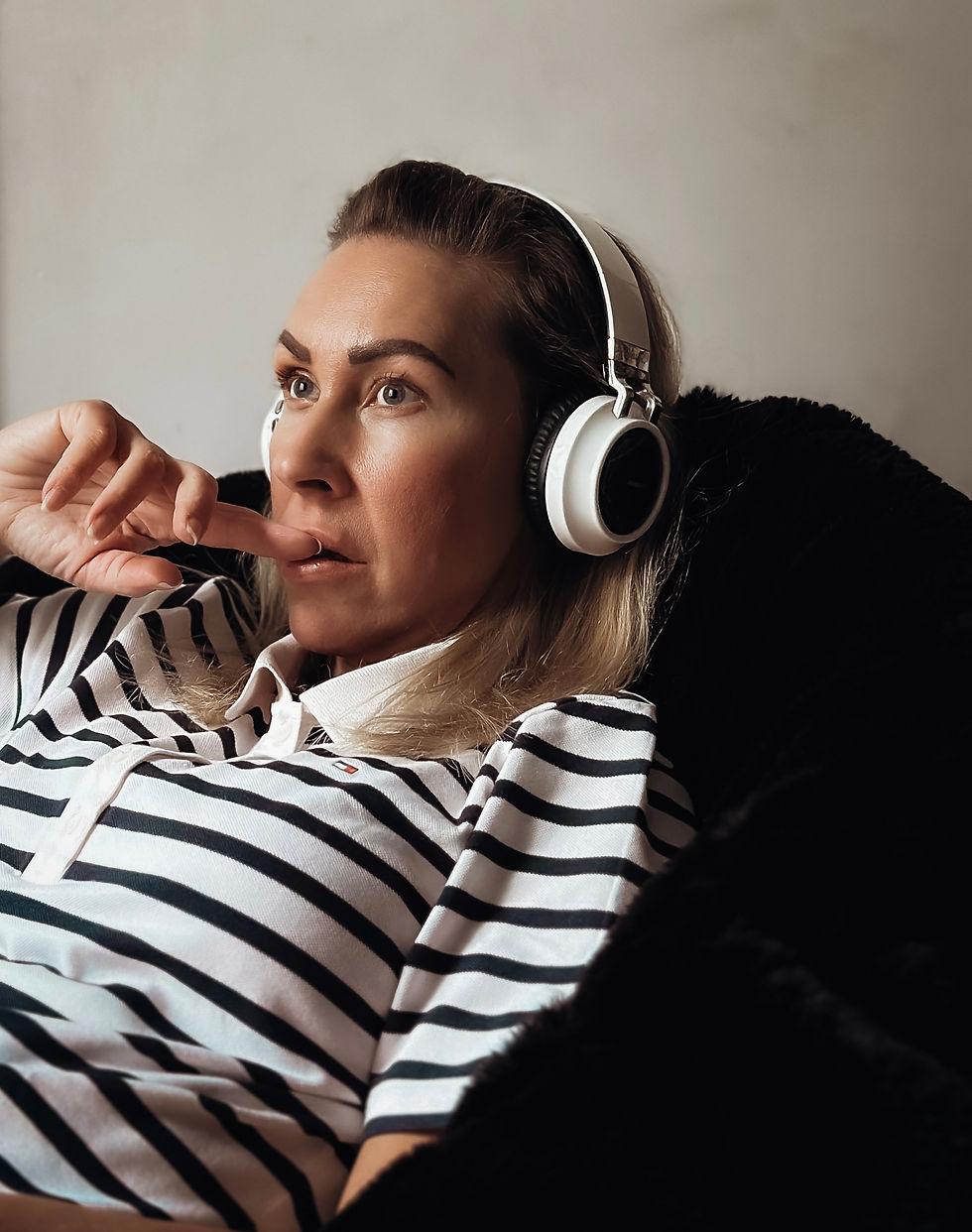The Healing Power of Music: How Songs Soothe the Mind and Body
- Eva

- Oct 16, 2024
- 6 min read

The Healing Power of Music: How Songs Soothe the Mind and Body
Article at a Glance
• My Personal story about the healing power of music
• Scientific research proving how music affects the body and mind
• Best tips and exercises to harness the healing power of music
• Examples of easy at-home activities to incorporate music into your daily routine
• Top five resources and research links for further reading

Hello Dear reader,
Music is my superpower. When I’m feeling low, stressed, or out of sync with life, nothing shifts my mood like the right tune. Whether it’s a gentle melody to calm my nerves or an upbeat track that makes me want to dance, music has this magical ability to bring me back to life. It’s more than just entertainment; it’s like an emotional reset button.
For me, music is so powerful that sometimes I feel it’s the only language that truly speaks to my soul. If you’ve ever put on your favourite song and felt your spirits lift immediately, you know exactly what I’m talking about. But it’s not just a feeling—science backs it up too.
I remember listening to a fascinating podcast with René Fleming, where she dove into how music impacts our brain and body. She explained that it’s more than just a personal experience; there are actual physiological changes that happen when we listen to music. And guess what? It’s all scientifically proven!
In this article, I want to share why I believe music can heal the mind and body. I’ll give you some tips on how to use music in your daily life to feel better and even suggest some easy exercises you can do at home. But first, let’s explore why music has this incredible healing power.
Music: The Science Behind the Magic
Let’s start with the science—because while it may feel like magic, music’s effect on the body and mind is very real. When you listen to music, your brain releases dopamine, the “feel-good” hormone( Oh..Yeahh..!). This is the same chemical that makes us feel happy when we eat chocolate or fall in love.
But it goes deeper than that. According to various studies, music can reduce stress, lower blood pressure, and even ease pain. Researchers have found that music therapy can help people with conditions like depression, anxiety, and PTSD. The American Music Therapy Association even promotes music as a way to help people with heart conditions, neurological disorders, and those recovering from surgery.
René Fleming, the famous opera singer I mentioned earlier, has worked closely with neuroscientists to explore how music can stimulate brain activity. She has been a part of the Sound Health Initiative, a collaboration between the National Institutes of Health and the Kennedy Center, which looks into how music impacts mental health, cognitive function, and emotional well-being.
A study published by the Harvard Medical School found that music can boost immune function and lower stress levels. Think about that for a second—by simply listening to your favorite tunes, you could be giving your body a little health boost. That’s the power of music.

My Personal Journey with Music
On a personal level, music is my go-to therapy. Whenever I feel overwhelmed, I pop in my earbuds and let the music work its magic. It’s like switching on a light inside me that had been dimmed. I can go from feeling hopeless to hopeful within minutes (Yes,this is me!).
There’s a song for every mood. If I need to calm down, I’ll go for something slow and soulful—maybe some classical piano or acoustic guitar. On days when I need an energy boost, I’m all about upbeat pop or high-energy electronic music. No matter what I’m feeling, there’s always a song that can perfectly match my emotional state and help me through it.
What I find fascinating is how different genres affect me differently. Classical music can help me focus, jazz can relax me after a long day, and rock music can make me feel empowered and unstoppable. It’s as if each genre holds a specific type of healing energy.
The Healing Power of Music: Tips and Tricks
So, how can you tap into the healing power of music in your everyday life? Here are some simple tips to get started:
1. Create a “Mood Boost” Playlist
This is something I do regularly, and it’s a game-changer. Curate a playlist with songs that instantly make you feel good. It can be anything from nostalgic hits that bring back happy memories to upbeat tracks that get you moving. Having this playlist ready means you’re always prepared when a bad mood strikes.
2. Start Your Day with Music
Instead of scrolling through your phone first thing in the morning, try playing some relaxing or energising music to start your day off on the right foot ( It's one of my must-have things). This sets a positive tone for the day and helps you feel more in control.
3. Incorporate Music into Exercise
Exercise is great for mental health, and when you pair it with music, the benefits are amplified. Whether it’s a high-energy workout with some fast beats or yoga with calming instrumental music, the combination of movement and sound can help reduce stress and boost your mood.
4. Use Music for Mindfulness
Mindfulness doesn’t have to be all about meditation and silence. You can practice mindfulness by simply listening to music and focusing on the sounds, melodies, and lyrics. Let yourself be present in the moment, letting the music wash over you.
5. Experiment with Different Genres
Don’t stick to just one type of music. Explore different genres and see how they make you feel. You might find that certain types of music resonate with you more depending on your emotional state. For example, classical music has been shown to improve focus, while jazz can promote relaxation.

Activities and Exercises You Can Do at Home
Here are some easy ways to incorporate music into your daily routine:
1. Music Meditation
Sit or lie down in a quiet room and play soft, instrumental music. Close your eyes and focus on the sound. Let your mind drift, and allow the music to guide your breathing. This is a great way to reduce anxiety and stress.
2. Music and Journaling
Pair journaling with music. While listening to your favorite tunes, write about your thoughts and feelings. You might find that music helps you unlock emotions and memories that are hard to access otherwise.
3. Dancing in Your Living Room
Dancing is one of the best ways to lift your spirits, and you don’t need a partner or a fancy dance floor to do it ( I have my mirror!). Put on your favorite song and let loose in your living room. Not only will you get a great workout, but you’ll also feel an instant mood boost.
4. Sing Along
Singing, even if you’re not particularly good at it, can be incredibly cathartic. Whether it’s in the shower, your car, or while doing household chores, singing releases endorphins and makes you feel good. So, belt out those tunes!
5. Sound Healing with Instruments
If you play an instrument, spend a few minutes each day creating music. If you don’t, consider getting a small, simple instrument like a kalimba or hand drum. The act of making music can be meditative and healing.
Conclusion
Music is more than just a form of entertainment; it’s a healing tool that can lift our spirits, reduce stress, and even improve our physical health. Whether you’re creating a playlist for tough days or dancing your stress away in the living room, music is a simple yet powerful way to feel better every day.
So, next time you’re feeling down, turn up the volume and let the music do the talking. And remember, it’s okay to dance like no one’s watching—even if they are!
Do you have a favourite song or genre that instantly lifts your mood? Drop it in the comments! Let’s create a community playlist of feel-good tunes together.
With positive tunes,
Eva

My Latest Research and Resources on Music Healing
Here are some world-class resources that delve deeper into the science behind music and healing:
• American Music Therapy Association: Learn more about how music therapy is used to treat various mental and physical health conditions.
Music Therapy
• Sound Health Initiative: A project exploring the intersection of music and neuroscience.
Sound Health Initiative
• Harvard Health Publishing: An article discussing how music can help reduce stress and improve health.
Harvard on Music and Health
• British Association for Music Therapy: Information about the therapeutic benefits of music in the UK.
British Association for Music Therapy
• World Federation of Music Therapy: Global insights into the use of music therapy in different cultures.
World Federation of Music Therapy




Comments